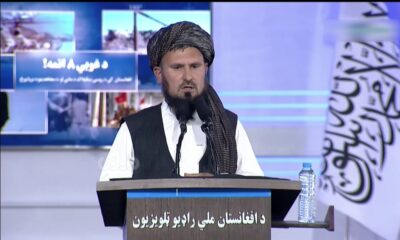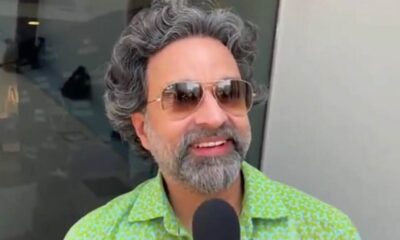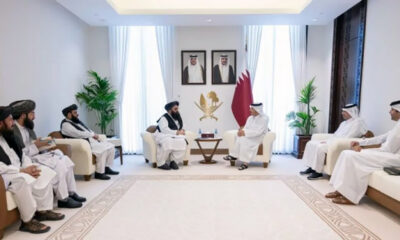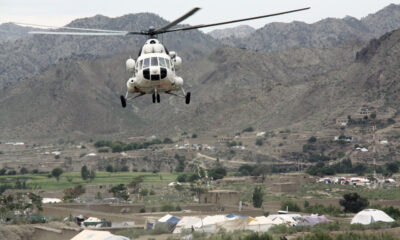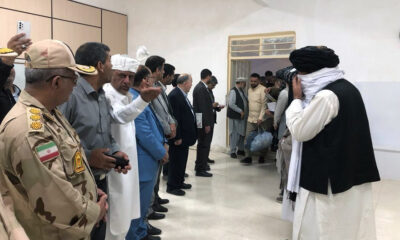World
German Social Democrats beat conservatives in vote to decide Merkel successor

Germany’s Social Democrats narrowly won Sunday’s national election, projected results showed, and claimed a “clear mandate” to lead a government for the first time since 2005 and to end 16 years of conservative-led rule under Angela Merkel.
The centre-left Social Democrats (SPD) were on track for 26.0% of the vote, ahead of 24.5% for Merkel’s CDU/CSU conservative bloc, projections for broadcaster ZDF showed, but both groups believed they could lead the next government.
With neither major bloc commanding a majority, and both reluctant to repeat their awkward “grand coalition” of the past four years, the most likely outcome is a three-way alliance led by either the Social Democrats or Merkel’s conservatives.
Agreeing a new coalition could take months, and will likely involve the smaller Greens and liberal Free Democrats (FDP).
“We are ahead in all the surveys now,” the Social Democrats’ chancellor candidate, Olaf Scholz, said in a round table discussion with other candidates after the vote.
“It is an encouraging message and a clear mandate to make sure that we get a good, pragmatic government for Germany,” he added after earlier addressing jubilant SPD supporters.
The SPD’s rise heralds a swing left for Germany and marks a remarkable comeback for the party, which has recovered some 10 points in support in just three months to improve on its 20.5% result in the 2017 national election.
Scholz, 63, would become the fourth post-war SPD chancellor after Willy Brandt, Helmut Schmidt and Gerhard Schroeder. Finance minister in Merkel’s cabinet, he is a former mayor of Hamburg.
Scholz’s conservative rival Armin Laschet, signalled his bloc was not ready yet to concede, though his supporters were subdued.
“It hasn’t always been the first-placed party that provided the chancellor,” Laschet, 60, told the round table. “I want a government where every partner is involved, where everyone is visible – not one where only the chancellor gets to shine,” he said in an early attempt to woo smaller parties.
Schmidt ruled in the late 1970s and early 1980s in coalition with the FDP even though his Social Democrats had fewer parliamentary seats than the conservative bloc.
Attention will now shift to informal discussions followed by more formal coalition negotiations, which could take months, leaving Merkel in charge in a caretaker role.
Scholz and Laschet both said they would aim to strike a coalition deal before Christmas.
Merkel plans to step down after the election, making the vote an era-changing event to set the future course of Europe’s largest economy.
She has stood large on the European stage almost since taking office in 2005 – when George W. Bush was U.S. president, Jacques Chirac in the Elysee Palace in Paris and Tony Blair British prime minister.
After a domestic-focused election campaign, Berlin’s allies in Europe and beyond may have to wait for months before they can see whether the new German government is ready to engage on foreign issues to the extent they would like.
A row between Washington and Paris over a deal for Australia to buy U.S. instead of French submarines has put Germany in an awkward spot between allies, but also gives Berlin the chance to help heal relations and rethink their common stance on China.
On hearing that the SPD were slightly ahead in polls, U.S. President Joe Biden told reporters in Washington: “I’ll be darned… They’re solid.”
On economic policy, French President Emmanuel Macron is eager to forge a common European fiscal policy, which the Greens support but the CDU/CSU and FDP reject. The Greens also want “a massive expansion offensive for renewables”.
“Germany will end up with a rather weak chancellor who will struggle to get behind any kind of ambitious fiscal reform at the EU level,” said Naz Masraff at political risk consultancy Eurasia.
Whatever coalition ends up in power, Germany’s friends can at least take heart that moderate centrism has prevailed, and the populism that has taken hold in other European countries failed to break through.
The projected results for ZDF showed the far-right Alternative for Germany (AfD) on track for 10.5%, worse than four years ago when they stormed into the national parliament with 12.6% of the vote, and with all mainstream groupings ruling out a coalition with the party.
World
Trump urges Russia to stop attacks; Rubio says US might walk away from peace efforts
Zelenskiy wrote on the messaging app Telegram that his top military commander reported that Russia had already conducted nearly 70 attacks on Sunday.

President Donald Trump urged Russia on Sunday to stop its attacks in Ukraine while his top diplomat said the United States might walk away from peace efforts if it does not see progress, Reuters reported.
Speaking to reporters in New Jersey, Trump said he was disappointed that Russia has continued to attack Ukraine, and said his one-on-one meeting with Ukrainian President Volodymyr Zelenskiy at the Vatican on Saturday had gone well.
“I see him as calmer. I think he understands the picture, and I think he wants to make a deal,” Trump said of Zelenskiy.
U.S. Secretary of State Marco Rubio, meanwhile, said the Trump administration might abandon its attempts to broker a deal if Russia and Ukraine do not make headway.
“It needs to happen soon,” Rubio told the NBC program “Meet the Press.'” “We cannot continue to dedicate time and resources to this effort if it’s not going to come to fruition.”
Trump and Zelenskiy, in Rome for the funeral of Pope Francis, met in a Vatican basilica on Saturday to try to revive faltering efforts to end the war in Ukraine. The meeting was the first between the two leaders since an angry encounter in the White House Oval Office in February and comes at a critical time in negotiations aimed at bringing an end to the conflict, read the report.
Trump rebuked Russian President Vladimir Putin after that meeting, saying on social media that there is “no reason” for Russia to shoot missiles into civilian areas.
In a pre-taped interview that aired on the CBS program “Face the Nation” on Sunday, Russian Foreign Minister Sergei Lavrov said Russia would continue to target sites used by Ukraine’s military. When asked about a Russian strike on Kyiv last week that killed civilians, Lavrov said that “the target attacked was not something absolutely civilian” and that Russia targets only “sites which are used by the military.”
Zelenskiy wrote on the messaging app Telegram that his top military commander reported that Russia had already conducted nearly 70 attacks on Sunday.
“The situation at the front and the real activity of the Russian army prove that there is currently insufficient pressure on Russia from the world to end this war,” Zelenskiy said.
Ukrainian and European officials pushed back last week against some U.S. proposals on how to end the war, making counterproposals on issues from territory to sanctions.
American proposals called for U.S. recognition of Russia’s control over Crimea, the Ukrainian peninsula that Moscow seized and annexed in 2014, as well as de facto recognition of Russia’s hold on other parts of Ukraine.
In contrast, the European and Ukrainian proposal defers detailed discussion about territory until after a ceasefire is concluded.
German Defense Minister Boris Pistorius said on Sunday that Ukraine should not agree to the American proposal, saying it went too far in ceding swathes of territory in return for a ceasefire.
Mike Waltz, Trump’s national security adviser, said the U.S. president has “expressed his frustration” at both Putin and Zelenskiy but remains determined to help negotiate an agreement. Waltz also said the United States and Ukraine would eventually reach an agreement over rare earth minerals, Reuters reported.
Chuck Schumer, the top U.S. Senate Democrat, said on Sunday that he is concerned Trump will “cave in to Putin.”
“To just abandon Ukraine, after all the sacrifice that they made, after so much loss of life, and with the rallying of the whole West against Putin, it would just be a moral tragedy,” Schumer said on CNN’s “State of the Union” program.
World
Trump and Zelenskiy meet one-on-one in Vatican basilica to seek Ukraine peace
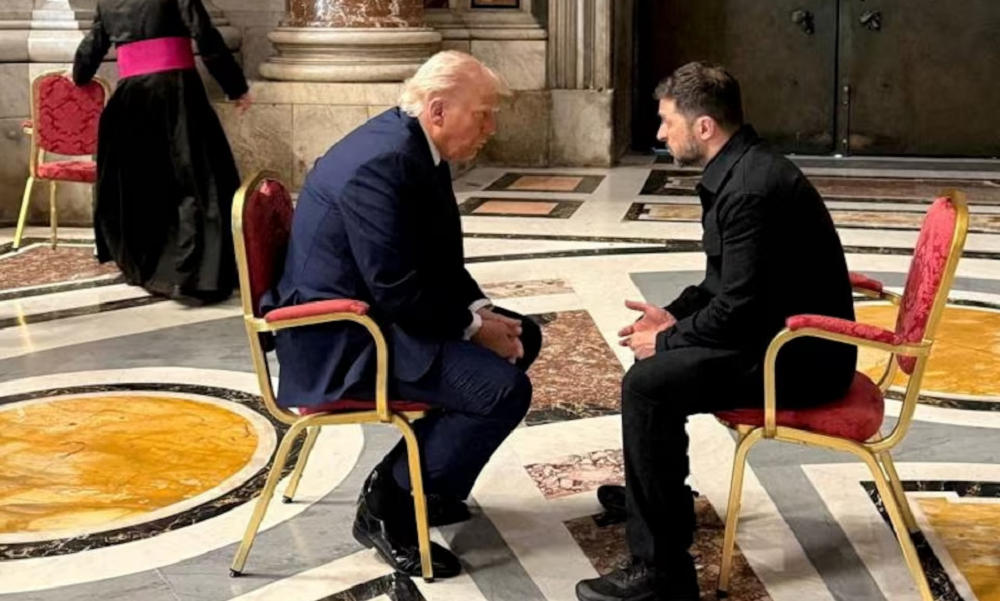
U.S. President Donald Trump and Ukrainian leader Volodymyr Zelenskiy, in Rome for the funeral of Pope Francis, met one-on-one in a marble-lined Vatican basilica on Saturday to try to revive faltering efforts to end Russia’s war with Ukraine.
Zelenskiy said the meeting could prove historic if it delivers the kind of peace he is hoping for, and a White House spokesman called it “very productive”.
The two leaders, leaning in close to each other with no aides around them while seated in St Peter’s Basilica, spoke for about 15 minutes, according to Zelenskiy’s office, which also released photographs of the meeting.
The meeting at the Vatican, their first since an angry encounter in the Oval Office in Washington in February, comes at a critical time in negotiations aimed at bringing an end to fighting between Ukraine and Russia.
In a post on social media platform Telegram, Zelenskiy wrote: “Good meeting. One-on-one, we managed to discuss a lot. We hope for a result from all the things that were spoken about.”
He said those topics included: “The protection of the lives of our people. A complete and unconditional ceasefire. A reliable and lasting peace that will prevent a recurrence of war.”
Zelenskiy added: “It was a very symbolic meeting that has the potential to become historic if we achieve joint results. Thank you, President Donald Trump!”
Steven Cheung, White House communications director, said the two leaders had met privately and had “a very productive discussion. More details about the meeting will follow”.
In one photograph released by Zelenskiy’s office, the Ukrainian and U.S. leaders sat opposite each other in a hall of the basilica, around two feet apart, and were leaning in towards each other in conversation. No aides could be seen in the image.
In a second photograph, from the same location, Zelenskiy, Trump, British Prime Minister Keir Starmer and French President Emmanuel Macron were shown standing in a tight huddle. Macron had his hand on Zelenskiy’s shoulder.
After Trump and Zelenskiy met in the basilica, the two men joined other world leaders outside in Saint Peter’s Square at the funeral service for Pope Francis, who made the pursuit of peace, including in Ukraine, a motif of his papacy.
Italian Cardinal Giovanni Battista Re, who gave the sermon at the funeral service, recalled how Pope Francis did not stop raising his voice to call for negotiations to end conflicts.
“War always leaves the world worse than it was before: it is always a painful and tragic defeat for everyone,” the cardinal said.
A Zelenskiy spokesman had earlier said aides to the two leaders were working on arrangements for a follow-up meeting in Rome later on Saturday. The spokesman subsequently said, after Trump’s aircraft took off from Rome, that the second meeting did not happen, citing the presidents’ tight schedules.
Trump, who has been pressing both sides to agree a ceasefire, said on Friday that there had been productive talks between his envoy and the Russian leadership in Moscow, and called for a high-level meeting between Kyiv and Moscow to close a deal.
Trump had previously warned his administration would walk away from its efforts to achieve a peace if the two sides do not agree a deal soon.
(Reuters)
World
Senior Russian military officer killed in car explosion near Moscow
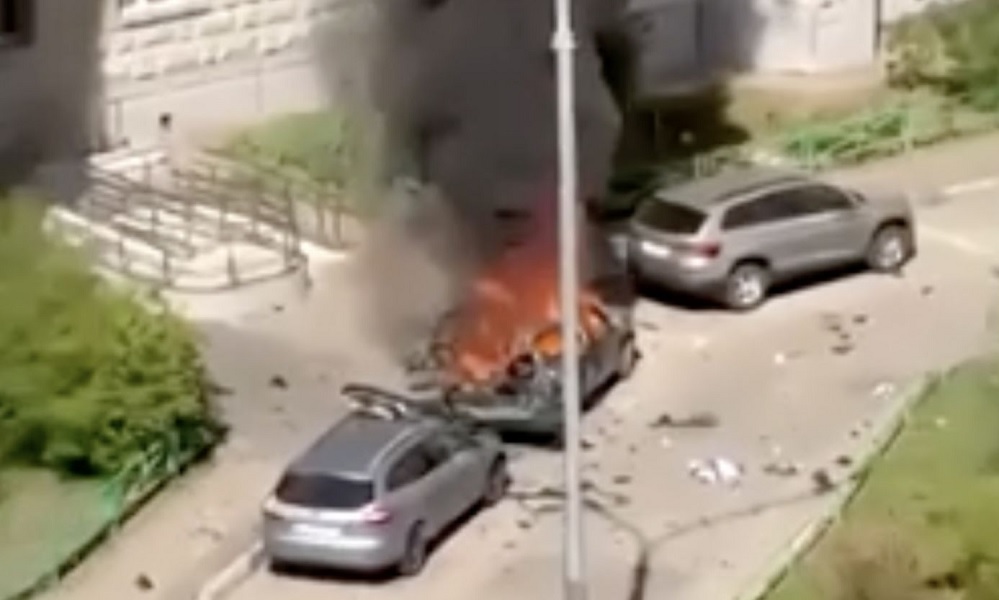
A senior Russian military officer was killed when a car exploded on Friday in the town of Balashikha just east of Moscow, Russia’s Investigative Committee said.
It named the officer as Yaroslav Moskalik, deputy head of the Main Operations Directorate of the General Staff of the Russian Armed Forces, and said it had opened a criminal case into the incident, Reuters reported.
“According to available data, the explosion occurred as a result of the detonation of a homemade explosive device filled with destructive elements,” the Investigative Committee said in a statement.
The statement did not say who might be behind the incident. Several high-ranking Russian military figures have been assassinated since the start of the war in Ukraine in operations blamed by Moscow on Kyiv.
Russian media outlet Baza, which has sources in Russia’s law enforcement agencies, said a bomb in a parked car had been detonated remotely when the officer – who lived locally – walked past.
The Izvestia newspaper published video footage showing a person approaching a line of parked cars outside an apartment complex and an explosion that sent parts of a vehicle flying metres into the air.
Kommersant newspaper said a second person was also killed.
Moskalik, who held the rank of major general, had participated in several high-level Russian delegations, according to defence ministry bulletins and media reports.
He joined the Russian contingent in a meeting in October 2015 of the Normandy Format, a group made up of teams from Germany, Russia, Ukraine and France who oversaw the Minsk agreements designed to end the war between Ukraine and Russian-backed separatist forces that broke out in 2014.
Moskalik represented the army’s General Staff at the negotiations alongside Foreign Minister Sergei Lavrov and Kremlin aide Yuri Ushakov, according to the Kremlin website.
Russia’s RBC newspaper listed Moskalik as a participant in the security subgroup in the Minsk talks.
In December, Ukraine’s SBU intelligence service used a bomb hidden in an electric scooter to kill Lieutenant General Igor Kirillov, whom Kyiv accused of being responsible for the use of chemical weapons against Ukrainian troops.
The SBU did not immediately respond to a request for comment on the reported death of Moskalik.
-

 Latest News5 days ago
Latest News5 days agoAWCC activates new site in Nangarhar’s Kuz Kunar district
-

 Latest News5 days ago
Latest News5 days agoTarig Ali Bakheet and Japan’s Deputy Foreign Minister discuss Afghanistan’s situation
-

 Business5 days ago
Business5 days agoPakistan’s deputy PM discusses Trans-Afghan Railway Line project with Uzbek FM
-
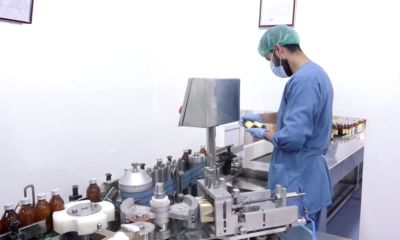
 Latest News3 days ago
Latest News3 days agoAfghanistan’s medicine output reaches 900 types: Pharma Union
-

 Latest News4 days ago
Latest News4 days agoAfghan delegation to participate in Iran’s international expo
-
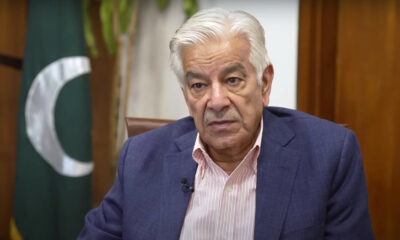
 Latest News4 days ago
Latest News4 days agoTerrorist attacks in Pakistan originate from Afghanistan: Khawaja Asif
-

 Latest News4 days ago
Latest News4 days agoWFP appeals for $25 million to help support Afghan returnees amid humanitarian crisis
-

 Latest News4 days ago
Latest News4 days agoRegistered Afghan refugees must return by June 30 or face deportation: Pakistani official


